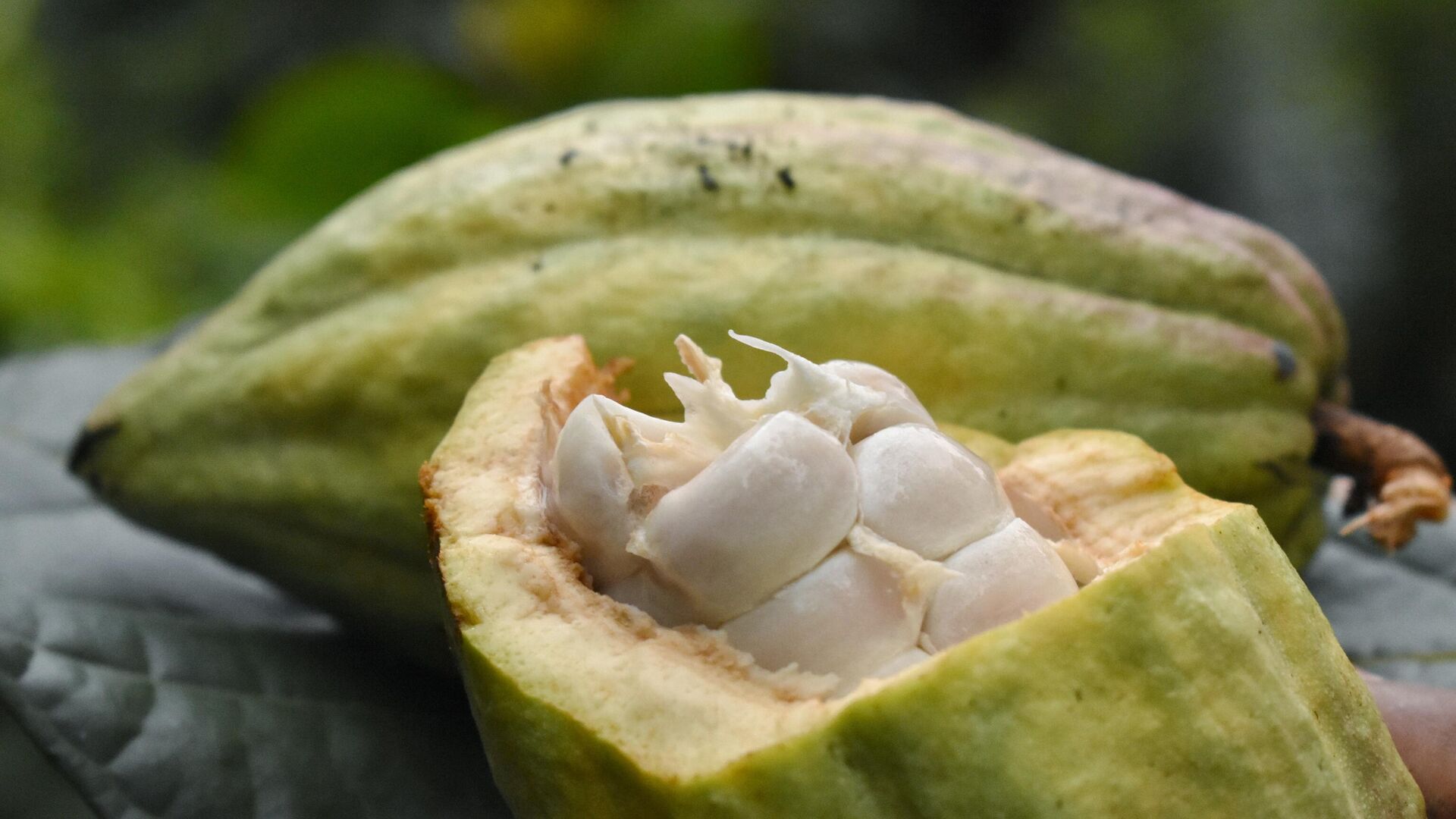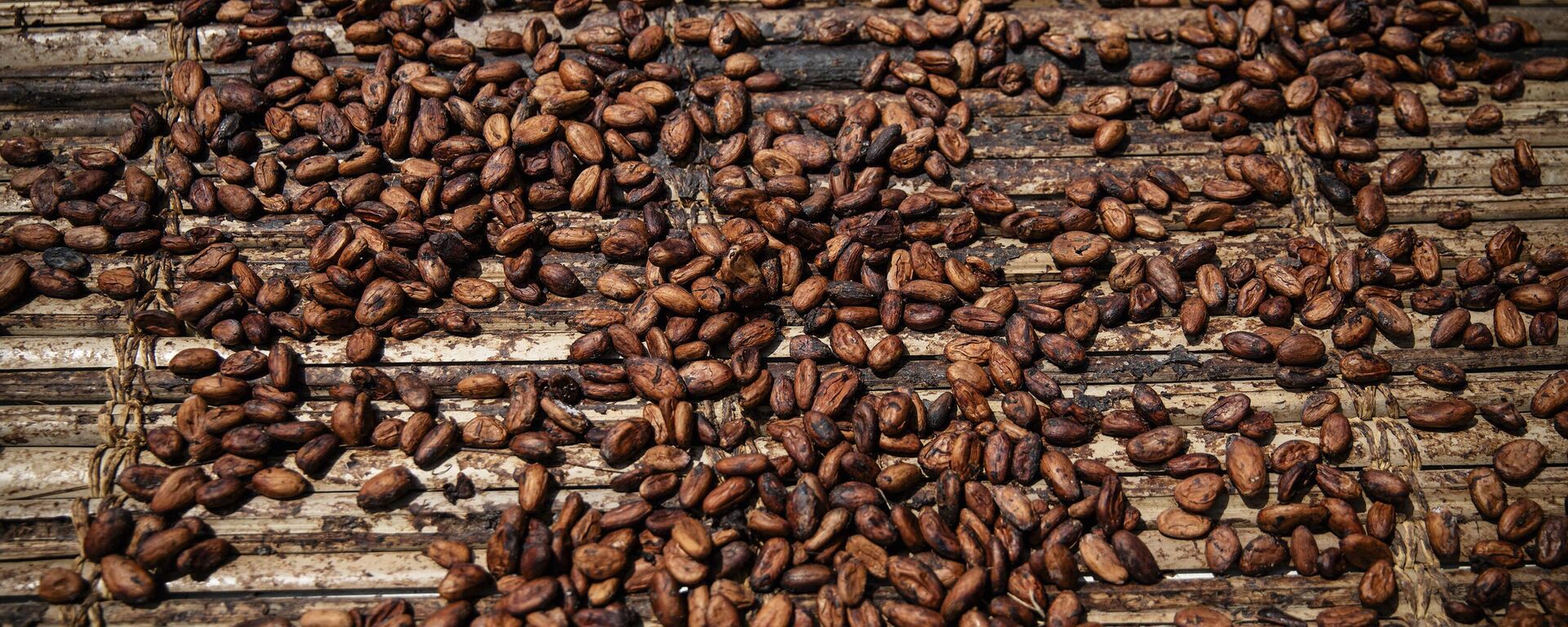https://en.sputniknews.africa/20241230/dry-spell-reportedly-threatens-quality-and-yield-of-cote-divoires-upcoming-cocoa-harvest-1069967910.html
Dry Spell Reportedly Threatens Quality and Yield of Cote d'Ivoire's Upcoming Cocoa Harvest
Dry Spell Reportedly Threatens Quality and Yield of Cote d'Ivoire's Upcoming Cocoa Harvest
Sputnik Africa
The global cocoa market is in turmoil as prices soar to unprecedented levels, exceeding $10,000 per ton, driven by a perfect storm of challenges affecting... 30.12.2024, Sputnik Africa
2024-12-30T17:14+0100
2024-12-30T17:14+0100
2024-12-30T17:14+0100
sub-saharan africa
cote d'ivoire (ivory coast)
cocoa
west africa
agriculture
heavy rains
weather
export
https://cdn1.img.sputniknews.africa/img/07e7/09/1e/1062458572_0:160:3072:1888_1920x0_80_0_0_99e827d56146dd0ce193ab4ea3814aad.jpg
Concerns are rising among Cote d'Ivoire cocoa farmers as a dry spell threatens to impact the quality and yield of the upcoming harvest, according to Western media reports.The world's leading cocoa producer is currently experiencing its dry season (mid-November to March), but last week's lack of rainfall in key cocoa-growing regions has sparked worries about the main crop (October-March) and the subsequent mid-crop (April-September).Farmers in the Daloa, Bongouanou, and Yamoussoukro regions reported no rainfall whatsoever last week, levels significantly below the five-year average. This lack of moisture, they fear, could damage bean quality and lead to reduced yields starting in February.While sufficient pods remain for January harvesting, the ongoing drought could negatively affect the main crop's final stages and the crucial early development of the mid-crop.Farmers plan to closely monitor conditions throughout January, emphasizing the need for regular rainfall every 10 days to stimulate flowering and pod development for a strong mid-crop beginning in April.
https://en.sputniknews.africa/20241224/cocoa-bean-prices-could-rise-more-than-bitcoin-in-2024-media-reports-1069868098.html
cote d'ivoire (ivory coast)
west africa
Sputnik Africa
feedback@sputniknews.com
+74956456601
MIA „Rossiya Segodnya“
2024
Muhammad Nooh Osman
https://cdn1.img.sputniknews.africa/img/07e7/04/0a/1058467512_0:0:1280:1280_100x100_80_0_0_ec723833bcbfcaed2e21952965ad99e4.jpg
Muhammad Nooh Osman
https://cdn1.img.sputniknews.africa/img/07e7/04/0a/1058467512_0:0:1280:1280_100x100_80_0_0_ec723833bcbfcaed2e21952965ad99e4.jpg
News
en_EN
Sputnik Africa
feedback@sputniknews.com
+74956456601
MIA „Rossiya Segodnya“
Sputnik Africa
feedback@sputniknews.com
+74956456601
MIA „Rossiya Segodnya“
Muhammad Nooh Osman
https://cdn1.img.sputniknews.africa/img/07e7/04/0a/1058467512_0:0:1280:1280_100x100_80_0_0_ec723833bcbfcaed2e21952965ad99e4.jpg
cote d'ivoire (ivory coast), cocoa, west africa, agriculture, heavy rains, weather, export
cote d'ivoire (ivory coast), cocoa, west africa, agriculture, heavy rains, weather, export
Dry Spell Reportedly Threatens Quality and Yield of Cote d'Ivoire's Upcoming Cocoa Harvest
Muhammad Nooh Osman
Writer/Editor
The global cocoa market is in turmoil as prices soar to unprecedented levels, exceeding $10,000 per ton, driven by a perfect storm of challenges affecting major producers in West Africa, notably Cote d'Ivoire and Ghana. Since the beginning of 2024, prices have jumped up 2.4 times.
Concerns are rising among
Cote d'Ivoire cocoa farmers as a dry spell threatens to impact the quality and yield of the upcoming harvest, according to Western media reports.
The world's leading cocoa producer is currently experiencing its dry season (mid-November to March), but last week's lack of rainfall in key cocoa-growing regions has sparked worries about the main crop (October-March) and the subsequent mid-crop (April-September).
Farmers in the Daloa, Bongouanou, and Yamoussoukro regions reported no rainfall whatsoever last week, levels significantly below the
five-year average. This lack of moisture, they fear, could damage bean quality and lead to reduced yields starting in February.
While sufficient pods remain for January harvesting, the ongoing drought could negatively affect the main crop's final stages and the crucial early development of the
mid-crop.
Farmers plan to closely monitor conditions throughout January, emphasizing the need for regular rainfall every 10 days to stimulate flowering and pod development for a strong mid-crop beginning in April.



